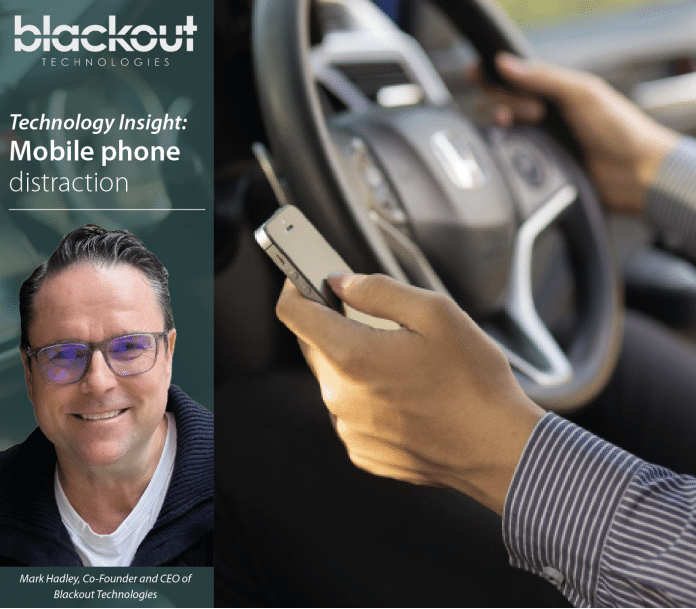Introduction
The Police’s Operation Tramline – using unmarked HGVs to carry out patrols on the road network – identified 51,500 driving offences, of which 13,553 involved illegal mobile phone use. What these statistics suggest is that too many drivers are still willing to flout mobile phone laws, regardless of the legal consequences or potential human cost.
Essential Fleet Manager Operator spoke with Mark Hadley, Co-Founder and CEO of Blackout Technologies, about the dangers of using a smartphone when driving. We discussed how illegal mobile device usage is surging, the risks it poses to essential fleet operations and how technology is evolving to address this growing problem.
Interview
Q: What is the scale of the problem?
Using a smartphone makes you four times more likely to have a collision when driving, with mobile device distraction believed to contribute to as many as 40% of vehicle collisions. In 2023, there was a 93% year-on-year increase in drivers caught illegally using a mobile phone and a significant proportion of drivers openly admit to using their smartphones behind the wheel, especially in the 17 to 24 age group. Worryingly, almost a third of under-25s have admitted to video calling while driving.
Q: What are the current mobile phone driving laws?
To hold or use a mobile phone or any handheld device while driving on the UK road network is illegal. The penalties for being caught include a £200 fine and 6 points on your licence – with professional drivers fined up to £2,500 – while new HGV drivers face losing their licence if within two years of passing their test.
HGV drivers caught using their mobile twice will face a Magistrates Court summons, as well as being referred to the Traffic Commissioner that could result in their professional licence being suspended or revoked. Operator licence holders may also face action from a Traffic Commissioner, if a driver is found to have used a handheld device behind the wheel to speak to their employer or customers.
Q: Why are essential fleets at risk?
Organisations have a duty of care to ensure they are meeting health and safety standards across their fleet operation and could be held liable in the event of a collision involving one of their vehicles. The consequences of non-compliance can be significant, with potential fines representing at least 20% of turnover and even a custodial sentence for those in charge if it results in serious injury or death. Essential fleets must also consider other potential threats to their operation, including increased insurance costs, staff shortages due to banned drivers, and reputational damage.
Q: Is telematics technology enough to combat mobile phone distraction?
Fleet and video telematics have evolved in recent years to better target driver behaviour and fleet risk, such as distracted driving, although this typically focuses on gaining insights after the incident and taking corrective action. Monitoring harsh driving events can effectively identify underlying issues, while driver-facing cameras can determine if a mobile device was in use during a near miss or collision.
AI cameras have also been introduced to identify and address distracted driving as it happens; however, there have been some concerns amongst drivers around privacy as well as the frequency of false positives, which can become an added distraction. Of course, telematics has an important role to play, but industry data suggests that more needs to be done to combat the problem.
Q: Tell us about mobile phone blocking and how it can help?
Emerging blocking technology – capable of preventing unauthorised access to smartphone apps and notifications while driving – is expected to be one of the next breakthrough technologies in the fight against mobile phone distraction.
When the vehicle is in motion, this type of tool automatically restricts encrypted messaging tools, the camera and other popular apps, and even prevents drivers using their smartphone when in stationary traffic. It can also possess crash detection functionality, meaning a notification can be sent to the driver to verify if a collision has occurred and check on their welfare, while also alerting the fleet manager.
Q: What is the next big thing in mobile phone blocking?
There is huge potential for SaaS-based mobile blocking technology combined with complementary systems, such as fleet and video telematics. This will take away the need for a separate Bluetooth beacon – eliminating additional hardware requirements or installation costs – and provides the tools needed to address the issue at source, support driver engagement and target fleet risk reduction.
Integrated blocking functionality has the potential to remove much of the temptation for drivers to take their eyes off the road and discourage illegal device usage.
By removing distraction, fostering improved concentration and promoting a responsible driving attitude, this approach is predicted to reduce collisions caused by illegal mobile phone usage by between 10 to 20%, preventing many avoidable injuries and deaths.
Q: Tell me something interesting about Blackout Technologies?
We provide organisations and employers with a comprehensive mobile device blocking solution across a range of industry sectors – such as financial services, contact centres, healthcare and facilities management – and business applications. The cutting-edge software enables the restriction of mobile devices and the control of non-essential applications and camera functionalities in the workplace and on the road to achieve legal compliance, reduce security risks, boost productivity and enhance safety.
Most recently, our technology is being used in schools to restrict mobile phone usage and reduce distraction with the aim of improving student welfare. A trial in three Surrey schools, involving around 2,300 students, has commenced to demonstrate the benefits, including greater focus in the classroom, a calmer learning environment and improved mental health.
To learn more, visit: www.blackout-technologies.com




